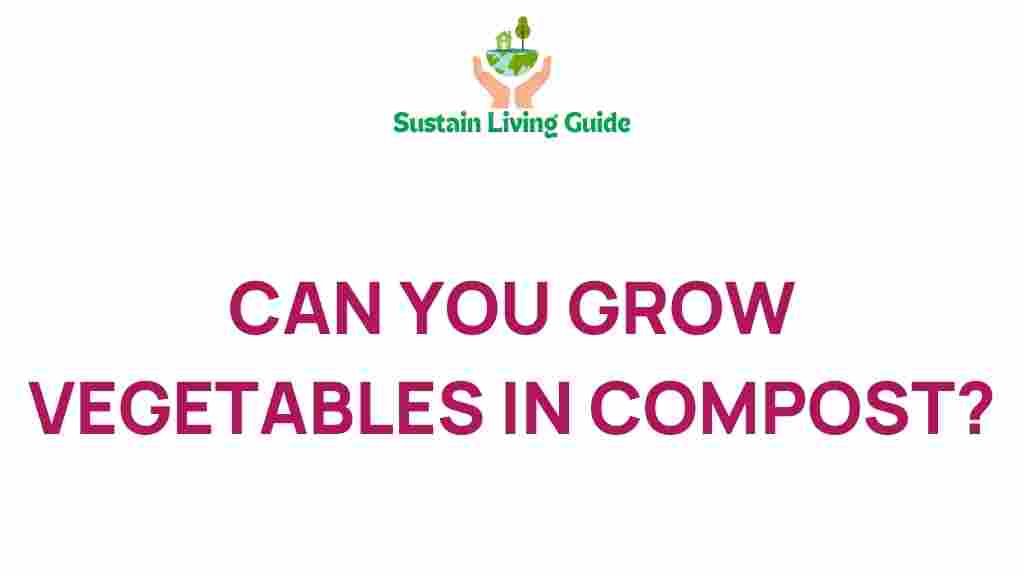The Surprising Truth: Can You Really Grow Vegetables in Compost?
Growing your own vegetables is a rewarding endeavor, but what if you could take it a step further by using compost? The concept of growing vegetables directly in compost might sound unusual to some, but it’s gaining traction among gardening enthusiasts. This article delves into the surprising truth about growing vegetables in compost, exploring its benefits, the methodology, and potential challenges.
What is Compost?
Compost is a rich, organic material created through the decomposition of plant and kitchen waste. It is often referred to as “black gold” by gardeners due to its numerous benefits for soil health and plant growth. Compost improves soil structure, retains moisture, and provides essential nutrients, making it an excellent base for growing vegetables.
Benefits of Using Compost for Growing Vegetables
Utilizing compost as a growing medium has several advantages:
- Nutrient-Rich: Compost contains essential nutrients that promote healthy plant growth.
- Improves Soil Structure: It enhances soil aeration and drainage, which is vital for root development.
- Water Retention: Compost can retain moisture better than regular soil, reducing the need for frequent watering.
- Eco-Friendly: Using compost helps recycle waste and reduces landfill contributions.
How to Grow Vegetables in Compost
If you’re keen on growing vegetables directly in compost, follow these steps to ensure a successful harvest:
Step 1: Choose the Right Compost
Not all compost is created equal. When selecting compost, look for:
- Well-Rotted Compost: Ensure the compost has aged adequately and is dark, crumbly, and has an earthy smell.
- Balanced Ingredients: A good compost mix should include browns (carbon-rich materials) and greens (nitrogen-rich materials).
- Free from Contaminants: Avoid compost that contains weed seeds, pathogens, or chemical residues.
Step 2: Prepare Your Growing Space
Choose a location that receives adequate sunlight (at least 6-8 hours daily) and is easily accessible for watering and maintenance. You can use:
- Raised Beds: Fill them with compost for better drainage and aeration.
- Containers: Use large pots or containers filled with compost for growing vegetables.
Step 3: Select Suitable Vegetables
Not all vegetables thrive in compost alone. Here are some that do well:
- Leafy Greens: Spinach, lettuce, and kale.
- Root Vegetables: Carrots, radishes, and beets.
- Herbs: Basil, parsley, and cilantro.
Step 4: Plant Your Vegetables
Once you’ve chosen your vegetables, it’s time to plant:
- Dig Holes: Create holes in the compost for seeds or seedlings based on their spacing requirements.
- Plant: Place seeds or seedlings into the holes and cover gently with compost.
- Water: Water thoroughly after planting but avoid overwatering, which can lead to root rot.
Step 5: Maintain Your Compost Garden
Regular maintenance is crucial for a thriving vegetable garden. Here’s what you need to do:
- Monitor Moisture: Keep the compost moist but not soggy.
- Fertilize: While compost is nutrient-rich, consider supplementing with organic fertilizers when necessary.
- Pest Control: Keep an eye out for pests and diseases, using organic methods for control.
Troubleshooting Tips for Growing Vegetables in Compost
Even with the best preparations, you may encounter challenges. Here are some common problems and solutions:
Problem 1: Poor Growth
If your vegetables aren’t growing well, consider the following:
- Insufficient Nutrients: Supplement with organic fertilizers or add more compost.
- Poor Drainage: Ensure your compost is not too dense; mix in some coarse materials like straw or wood chips.
Problem 2: Overwatering
Overwatering can lead to root rot and other fungal diseases. To manage this:
- Check Soil Moisture: Stick your finger into the compost to gauge moisture before watering.
- Improve Drainage: Add perlite or sand to enhance drainage if necessary.
Problem 3: Pest Infestation
Insects can be problematic for your vegetable garden. Prevent and manage pests by:
- Regular Inspection: Check your plants frequently for signs of pests.
- Using Natural Remedies: Consider using neem oil or insecticidal soap for treatment.
Conclusion
The idea of growing vegetables in compost may seem unconventional, but it can lead to bountiful harvests when done correctly. With its nutrient-rich composition and ability to retain moisture, compost serves as an excellent growing medium. By following the steps outlined in this article, you can transform your garden into a flourishing vegetable paradise.
For more information on composting and gardening tips, you can visit this link. Additionally, check out more resources from Gardening Know How to deepen your gardening knowledge.
Remember, the key to successful gardening lies in patience and observation. Happy gardening!
This article is in the category Eco-friendly and created by SustainLivingGuide Team
